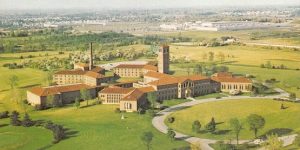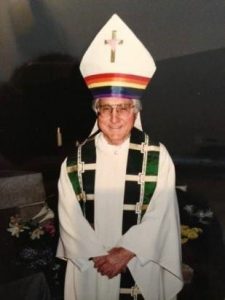by Church Militant • ChurchMilitant.com • September 17, 2018
By Jay McNally
To those who follow the inner working of the Catholic Church, it was old news when Catholic League President William Donohue in 2002 cited the archdiocese of Detroit (AOD) as essentially “ground zero” for understanding how homosexual and gay-friendly priests and bishops created and sustained the homosexual juggernaut that has brought such infamy to the Catholic Church.
Donohue cited the 1977 book Human Sexuality: New Directions for American Catholic Thought by Detroit seminary professor and president of the Catholic Theological Society of America Rev. Anthony Kosnik as a key corrupting influence. The widely hyped book challenged Church teaching across the board on sexuality.
Perhaps the comment that best summarizes the book came from Msgr. Hubert Maino, former editor of The Michigan Catholic, who said during a radio interview it was “soft on bestiality.”
“This book was widely used in seminaries at the time,” Donohue wrote. Indeed, by the time Donohue wrote his press release, rampant homosexuality among clergy in the AOD was widely known in Catholic circles for more than a generation, going back to 1980, when a bizarre program promoting homosexuality to seminarians at Detroit’s St. John’s Provincial Seminary made the front page of the National Catholic Register in 1980.
The program included a film that showed men masturbating as they spoke of the “salvific mission of Christ.” The film was part of a mandatory program all seminarians were required to attend. Back then, the Register’s editor was Fran Maier, who now serves as senior adviser and special assistant to Abp. Charles Chaput in the archdiocese of Philadelphia.
The front-page story about the program apparently gave pause to the new pope, John Paul II, who was scheduled to elevate St. John’s rector, Fr. Kenneth Untener, to the rank of bishop within two weeks. In spite of the controversy, which was covered by the local secular press and involved Cdl. John Dearden traveling to Rome to argue in favor of the program at the seminary, Untener was consecrated bishop.

Former St. John’s Provincial Seminary, Plymouth
Detroit conservatives complained as St. John’s became even more corrupt: Detroit’s liberal and dissenting clergy advanced the homosexual agenda throughout the archdiocese with a vengeance. Local homosexuals fondly referred to St. John’s as “the pink palace.”
Below is a simple timeline with names of notable priests who make up at least one branch of the homosexual network in Detroit. This list is from public and quasi-public published sources; each person listed has been cited as participating in events promoting homosexuality or cited by civil authorities for sex crimes.
To be sure, there are dozens of other priests who are involved in the “lavender mafia,” but they are more discreet in their activities. Not listed here are the more than two dozen priests who have been convicted of sex crimes or removed from ministry for homosexual activity; in part, because they are not known to openly publicly agitate against Church teaching on sex: Many were no doubt mindful they were sinners trapped in deadly addictions.
Before examining the list, readers will do well to view what is perhaps the most insightful analysis of the contemporary “gay crisis” by Catholic historian and columnist James Hitchcock. In his article titled “Secrecy and Subversion in the Church Has Historical Model,” first published by Catholic World Report in May 2002, Hitchcock explains how a powerful homosexual network of British spies known as the “Cambridge Five” worked for the Soviet Union from the 1930s to the 1960s with devastating consequences for the United Kingdom.
Even after various indiscretions and treasonous crimes committed by members of this group were known to U.K. political leaders, most of them refused to end it, covering up the crimes by the Cambridge group for decades. The “Cambridge Five” were lifelong friends going back to their college years.

Auxiliary Bp. Thomas Gumbleton
Hitchcock notes that while homosexual networks in some areas of society are open, such as in media and the arts, “In other areas, especially the Church, its mode of operation remains largely hidden, with only an occasional public scandal affording glimpses into its inner workings.”
This list is being published in an effort to shine a spotlight on the power of the homosexual network in the AOD. We are “connecting the dots.” Ever mindful of libel law, we cite this disclaimer: This author and Church Militant are not identifying any of the people on this list as being homosexuals, or making a judgment relating to any sexual activity they may or may not have been involved in, except in those where that activity was affirmed in courtroom legal proceedings.
This list, as noted, is of priests who have been identified, some by their own words, and others in various publications as participants in events that were primarily intended to challenge Church teaching on homosexuality. The timeline lists the estimated year their public leadership in the homosexual network seems to have begun.
Detroit’s network of homosexual Catholic priests began under the direction of Cdl. John Dearden, who started his sustained assault on Church teaching shortly after he returned from Vatican II in Rome in 1964:
Auxiliary Bp. Thomas Gumbleton, consecrated 1968: Dearden’s vicar general, who quickly made his mark as among the most revolutionary of American bishops. He has championed the homosexual cause at every turn at least since 1974, when he publicly agitated for the formation of Dignity/Detroit.
Father Anthony Kosnik, 1968: Kosnik became dean of Ss. Cyril and Methodius Seminary in 1968 and remained until 1983, four years after his book was condemned by the Vatican. As noted earlier, he laid the intellectual groundwork for a widespread assault against Church teaching with his book, Human Sexuality. He was enormously popular among liberal priests, often giving seminars and workshops at parishes, and was a priest in good standing until the day in 2002 when he married Dr. Margaret Stack, a psychologist employed by Abp. Allen Vigneron when he was rector of SHS. Dr. Stack’s job was to interview applicants to the seminary. During Vigneron’s tenure as SHS rector (1994–2003) a common complaint of faithful Catholics was that he systematically refused admittance to many spiritually and psychologically healthy men in favor of, one might say, less healthy men. I wrote about this in 2002 in New Oxford Review.
Father Gerald Shirilla, 1970: Perhaps the most influential and most-protected of all pederasts in the archdiocese of Detroit, Fr. Gerald Shirilla joined the faculty of Sacred Heart Seminary (SHS) only two years after his 1968 ordination. Court records indicate he was well into widespread molestation of altar boys in 1964, even before he was ordained. In the fall of 1970, only weeks into his first semester as a seminary professor, he was on the prowl, picking on college freshmen, one of whom committed suicide owing to Shirilla’s abuse, according to a fellow classmate who knew the deceased student well. A former seminarian who entered SHS in 1970 was shocked at what he saw, recalling, “Homosexuality was everywhere!” among faculty, staff and students; and it was evident, he added, to anyone and everyone who cared to open even one eyelid. Shirilla was removed from his SHS teaching post in 1980 for sexual involvement with seminarians but rejoined the faculty some years later. He was on the faculty, serving under then-rector John Nienstedt when he was publicly, supposedly, removed from ministry in 1993 when his predation of altar boys was widely publicized by secular media. Nevertheless, Shirilla reappeared as a pastor in 2002 in Alpena, Michigan, after his assignment was orchestrated by both Detroit Cdl. Adam Maida and Gaylord Bp. Patrick Cooney. The Shirilla case is worthy of extensive reportage because of the extent of his crimes and the extraordinary efforts that Cdl. Maida, Bp. Cooney, Msgr. John Zenz and Ned McGrath took in 2001 and 2002 to defend Shirilla. This author was deeply involved in the politics of AOD efforts regarding Shirilla in 1993. Notable, and so far never reported, is the personal relationship between Cdl. Dearden and Shirilla. Don Byrne, now deceased, was a prominent professor at the University of Detroit as well as a member of the parish council at Our Lady of Loretto parish, where Shirilla committed many of his crimes. Byrne and a priest who knew Shirilla have both said that Dearden used to visit the young priest Shirilla at Our Lady of Loretto’s parish rectory on afternoons and stay for many hours. Additionally, the janitor at Our Lady of Loretto told Byrne that Dearden used to drive to the rectory to join Shirilla for several years in the early 1970s — “every Friday night” — and then the two left for the evening, alone, in Dearden’s car.
Monsignor Thaddeus Ozog, 1970–75: Rector of SHS and best friend of Fr. Shirilla. Both were born and raised in Hamtramck, Michigan, and vacationed together in a camper during summers. Ozog died of AIDS in 1994. A nun who worked in the AOD chancery in 1990 revealed that Ozog had a well-established reputation for promoting homosexuality while he was rector. For example, she said, he expelled a new seminarian immediately after the young student inquired about the prevalence of homosexuality on campus in the early ’70s. The young man’s father was distraught and complained, she said, to AOD officials, to no avail.
St. John’s Provincial Seminary goes rogue, 1971: The tradition-minded Sulpician order, which staffed St. John’s Seminary for 24 years with no hint of homosexuality or dissent from Church teaching, was ousted in 1971 and replaced with local priests and nuns in leadership posts, many who proved to be of the Gumbleton stripe. It would take several hefty books to contain the already published accounts of widespread homosexuality at St. John’s from the Dearden era until it was closed by Cdl. Edmund Szoka, owing to the homosexual mess, in 1987.
Auxiliary Bp. Francis Reiss helps found Dignity/Detroit, 1974: Dignity/Detroit, a chapter of the national group that favors a complete overhauling of Church teaching on sexual matters, has cited the future auxiliary bishop of Detroit as the primary catalyst for the group’s founding. In 1996, Dignity/Detroit hosted a celebration of its 22nd anniversary and issued a program booklet which cited the contributions of 18 individuals who played a role in the growth of Dignity, including then-Fr. Francis Reiss. The exact text of the credit to then-Fr. Reiss reads: “Father Frank Reiss, whose intercession and help brought together the men who formed the nucleus of the chapter.” Dignity/Detroit in 1996 boasted of the membership of 22 AOD priests and the participation of four AOD bishops. Reiss was consecrated an auxiliary bishop for Detroit in 2003 and is today in residence and listed as an adjunct faculty member at Orchard Lake Seminary, where Anthony Kosnik began his career. Reiss was born and raised in Hamtramck.
Father Victor Clore, 1995: The longtime pastor of Christ the King parish in Detroit, Clore wrote a guest column in The Michigan Catholic praising Dignity and caustically accusing Church teaching of “hypocrisy.” The column is significant because by that time Dignity/Detroit was already more than 20 years old and the person with sole responsibility for deciding which articles would appear in the newspaper was Fr. Patrick Halfpenny, a classmate of Abp. Vigneron and soon-to-be vice rector of SHS under Vigneron.
Dignity Priests List
Below is a list of priests in the archdiocese of Detroit who have been significantly active with the group Dignity/Detroit. These names have been listed in official Dignity/Detroit weekly bulletins distributed at Dignity Masses, or have been seen participating in Dignity Masses. Some of these priests have held positions of significant responsibility in the AOD — some in key chancery positions. The bulk of the list was originally compiled in 1999 and has been updated with information gathered in recent years. These days, Dignity/Detroit is secretive about its member priests. Identifying info (parish and title) is from the AOD website and other sources:
Msgr. Clement Kern: Allowed Dignity/Detroit to operate at his parish, Most Holy Trinity. Died in 1983.
Fr. James Bajorum: Not listed on AOD website.
Fr. Richard Bartoszek: Listed on AOD website as “chaplain.”
Msgr. Ricardo Bass: Listed as “Clergy and Consecrated Life.”
Fr. Sam Campbell: Not listed on AOD website.
Fr. William Carnago: Not listed on AOD website.
Fr. Kenneth Chase: Vicar and pastor of Sacred Heart Parish, Dearborn.
Fr. John Child: Clergy and Consecrated Life.
Fr. Ron DeRosiers, S.M.: Assistant Professor at Madonna University, Livonia.
Fr. Dennis Dillon, S.J.: Pastor of St. Jary Student parish, Ann Arbor.
Fr. Randy Phillips: Pastor, St. Blase Parish, Sterling Heights. Has been on the faculty of Sacred Heart Seminary.
Fr. William Promesso: Pastor, St. Cyprian parish, Riverview.
Fr. Denis Theroux: Pastor, Our Lady of Victory parish, Northville.
Fr. Gary Tierney: Clergy and Consecrated Life.
Fr. Bob Williams: Central Services Staff, pastor, St. Justin-St. Mary Magdalen parish, Hazel Park
Fr. Harry Benjamin: Convicted and imprisoned for sexual conduct with a 14-year-old in 2002; said Masses for Dignity in Washington, D.C.
Fr. Marc Gawronski: Keynote speaker at Dignity’s anniversary dinner in 2004; SHS faculty member today.
It is notable that there is no known record of Abp. Vigneron ever commenting in any way about the presence of Dignity/Detroit since his installation as archbishop in 2009. His spokesman, Ned McGrath, issued a statement published by the Detroit Free Press on occasion of the group’s 40th anniversary. “There are hundreds of Masses celebrated in the Detroit archdiocese every weekend. … It’s always Archbishop Vigneron’s expectation that these liturgies are conducted in full conformity with the Catholic Church’s teachings and practices.”
Vigneron has refused to respond to multiple letters from this author regarding the group and is also known to have ignored many complaints and requests for information about Dignity/Detroit from many faithful Catholics.
A long-accepted principle of Church teaching and common law is “silence is consent.”
Jay McNally is former editor-in-chief of The Michigan Catholic. He has written investigative reports for several national Catholic publications about the archdiocese of Detroit and offers a unique perspective on how operations and current practices will have little to no positive impact and are, in fact, a blueprint for more destruction of the Faith.















